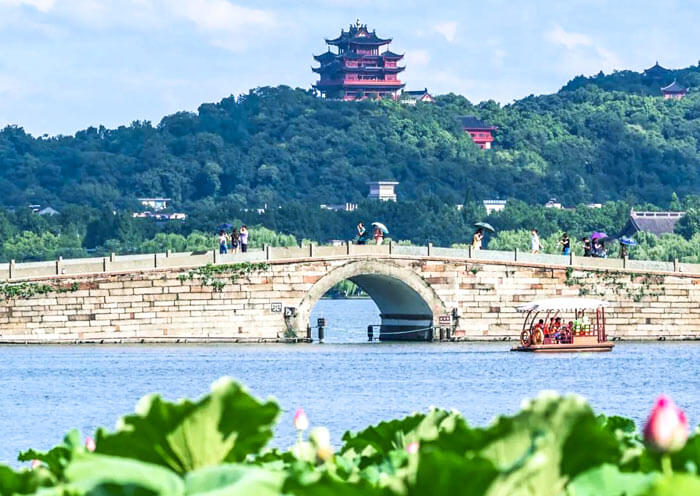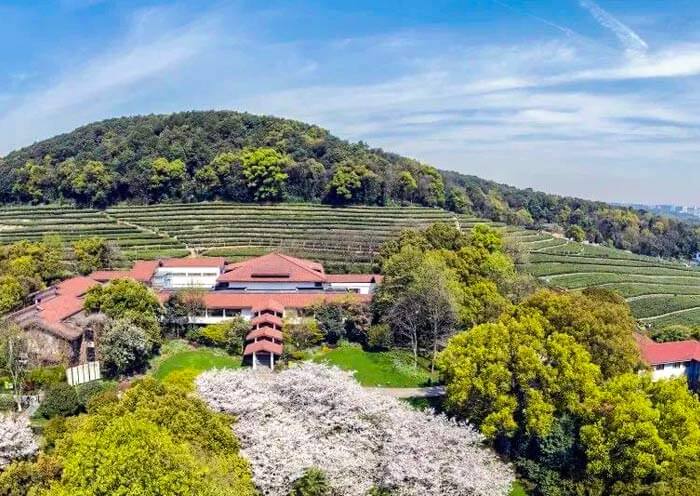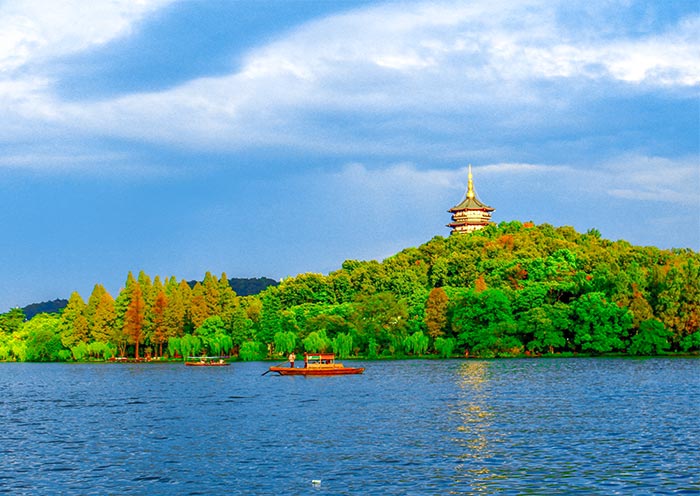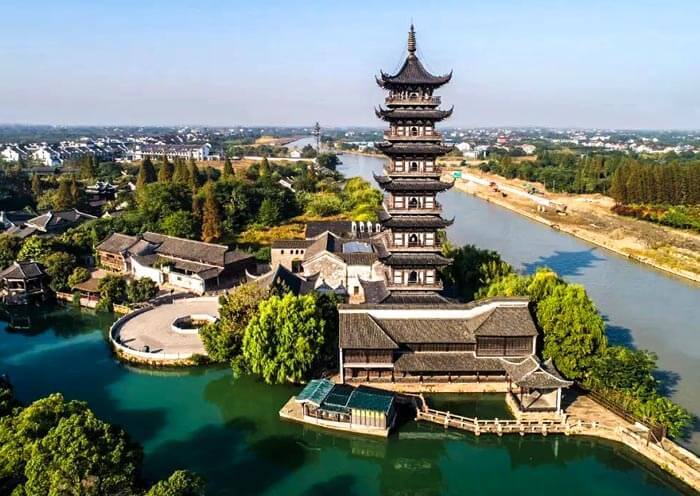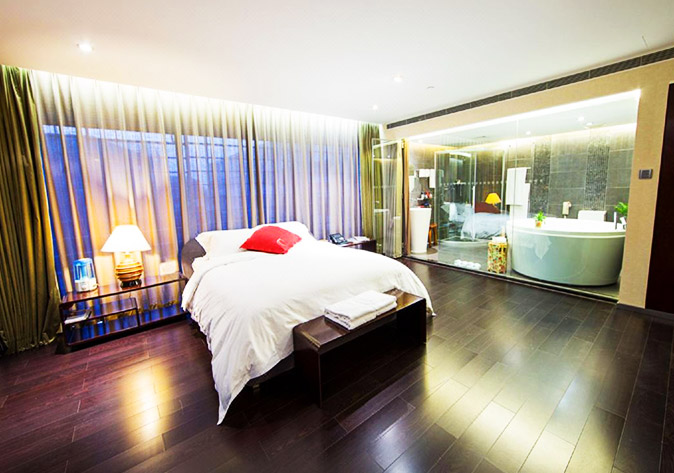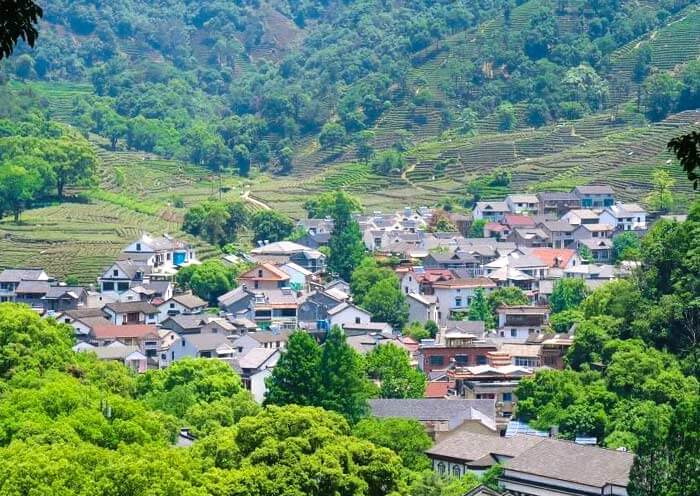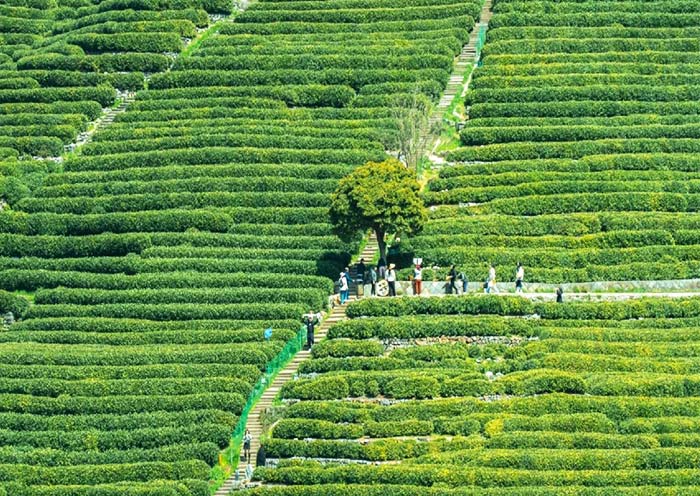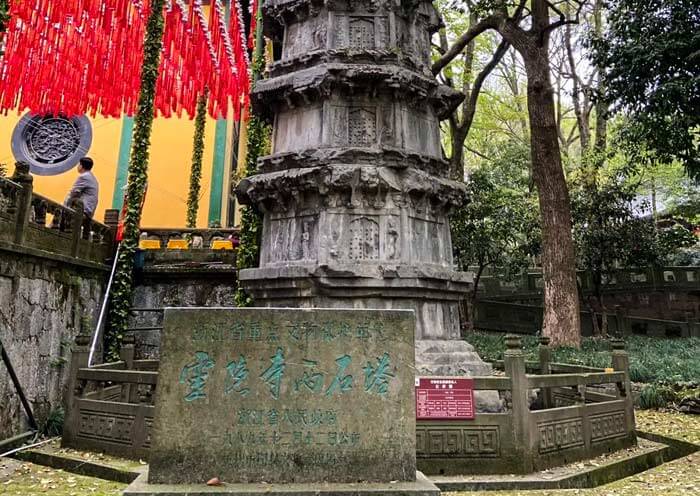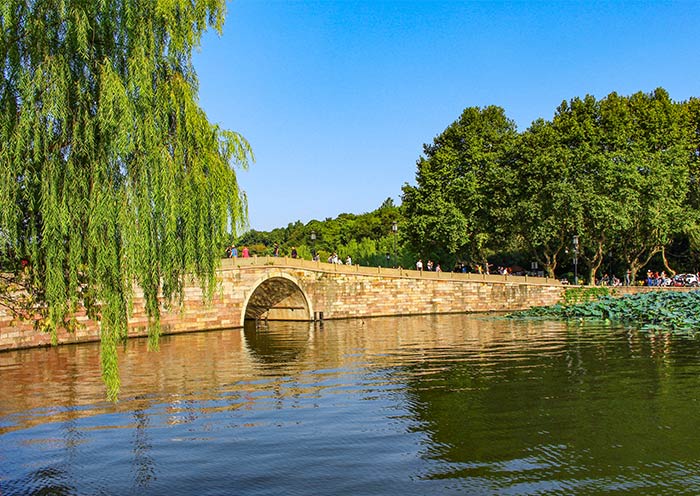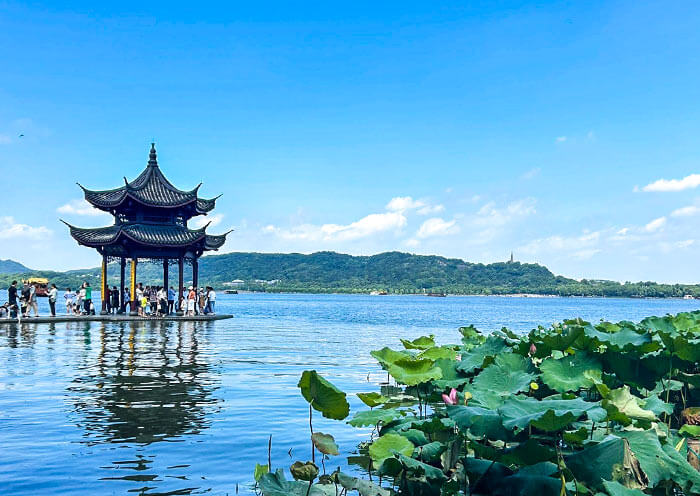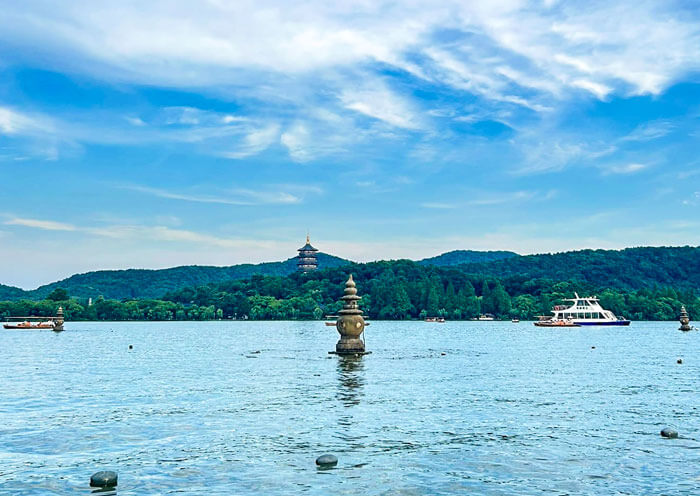This morning, your guide will meet you in the hotel lobby and escort you to explore Hangzhou, the “Heaven on Earth” and a cultural city with a history of over 5,000 years.
You will first visit China National Tea Museum (China Tea Museum), the only national-level thematic museum in China dedicated to tea and tea culture. It houses a collection of 3,865 items, including 156 precious artifacts, 170 specimens of tea leaves from ancient to modern times, and 349 sets of foreign tea utensils. The museum is divided into two distinct branches: Shuangfeng Branch and Longjing Branch (located 3km apart). Shuangfeng Branch is closer to West Lake and is a beautiful Jiangnan-style garden. Besides a statue of Lu Yu (茶圣陆羽), the Sage of Tea, and a special exhibition on West Lake Longjing Tea, here, you can learn about Chinese Tea Culture and the life cycle of tea plants, appreciate various exquisite tea utensils, gain insights into ancient tea-drinking and tea-making methods. Longjing Branch is built on a hillside, with tea trees, tea pavilions, and ponds interspersed in between. From the tea altar at the mountaintop, you can enjoy panoramic views of West Lake and the surrounding tea mountains. In Longjing Branch, you can learn about Global Tea Culture, how tea spread from China to the world, and China's intangible cultural heritage of traditional tea-making techniques, China's historic tea ceremonies, and related customs, such as the Tang Dynasty's Tea Boiling and the Song Dynasty's Dian Cha (点茶foam art on the tea cup). (Note: You can choose the branch you would like to visit based on your interests and available time.)
Next, move to Meijiawu Tea Culture Village, the biggest Longjing Tea producing spot. It is said that a trip to Hangzhou won’t be complete without visiting Meijiawu Tea Village. It has hosted many national leaders, government heads, and friendly visitors worldwide since the 1950s. During the Qingming Festival (early spring), tea-picking women are busy harvesting tea leaves, creating the scenic of "Meijiawu Early Spring", one of the 10 New Views of West Lake. It is said that more than 30,000 hand-picked fresh tea buds are needed to produce 1 kg of high-quality Longjing Tea (Dragon Well Tea). Meijiawu has a history of tea cultivation for over 600 years. As you stroll along its ancient streets lined with Ming and Qing dynasty buildings, you will encounter numerous tea workshops, hear the soothing sounds of gurgling streams, and be enveloped by the delightful fragrance of tea. You can also visit Lu Zhenghao Tea Plantation (卢正浩茶庄) to see the old tea roasting process and learn traditional tea-making techniques, experiencing the charm of intangible cultural heritage. Lu Zhenghao (卢正浩) is well-known in the Hangzhou tea industry. Premier Zhou Enlai visited Meijiawu 5 times (1957-1963), meeting Lu Zhenghao each time, showing great concern and guidance for tea production and development. Meijiawu's West Lake Longjing tea gained fame thanks to Lu Zhenghao and became a national gift tea, renowned worldwide. You can also visit the Premier Zhou Memorial Hall (周总理纪念室, Closed on Mondays) to learn more. Mejiawu is also a great place for lunch with authentic Hangzhou cuisine and to enjoy a cup of Longjing Tea (Green Tea), one of the Top 10 Famous Teas in China.
After lunch, head to Lingyin Temple (灵隐寺), situated at the west end of West Lake and inside the Feilai Peak Scenic Area (飞来峰景区). As one of the "Top 10 Zen Buddhist Temples in China", Lingyin Temple is considered a sanctuary for the soul and attracts countless pilgrims. Founded in 328 AD by an Indian monk named Hui Li (慧理), it is the oldest and most famous temple in Hangzhou, with a history of over 1,700 years. Directly facing Lingyin Temple is a hill with a peculiar name, Peak Flying from Afar (飞来峰, Feilai Peak). Composed of limestone, it stands out distinctively from the surrounding mountains. Legend has it that when Hui Li saw this peak, he exclaimed, "It's a part of Holy Mount Grahrakuta. Why has it flown here?" Hence, it acquired the name "Peak Flying from Afar." He also believed that Feilai Peak was a hidden dwelling of immortals. That is why he built a temple facing the peak and named it "Lingyin", which means "a hidden dwelling of immortals". While exploring inside Lingyin Temple, you will come across two stone pagodas (built in 960 AD) located on the east and west sides in front of the Great Hall of the Mahavira. These pagodas are the oldest relics of the temple. As you hike through the temple, you will hear stories and learn about the history behind the towering trees and numerous Buddhist grottoes. Amidst the impressive landscape and Buddhist culture, you will encounter the largest statue of the Buddha Sakyamuni in the lotus position, and believers lighting incense as they offer their prayers. It is believed that the most effective prayer at Lingyin Temple is for seeking romantic relationships. Also, for Chinese people, Lingyin Temple is the place where the famous Jigong (济公) became a monk and practiced. Jigong is usually known as a legendary mad monk who helped people with a magic fan, although he could have been a real person named Li Xiuyuan (李修缘, 1130 or 1148-1209) from the Southern Song Dynasty. You can learn more interesting stories about the crazy monk at the Hall of Jigong (济公殿).
After that, you will discover the picturesque West Lake (UNESCO World Heritage Site) like a local. The West Lake (西湖) is large, and you can choose to hike, ride a bike (free for the first hour), board a boat (self-pay), or take a sightseeing bus (self-pay) to explore it. As the city symbol of Hangzhou, it is adorned with temples, museums, islands, villas, tea houses, memorial halls, pools, arched bridges, pagodas, monasteries, and casual walkways lined with classic willow trees. The culture-laden West Lake overwhelms every visitor with its beauty. For Chinese people, West Lake is the most romantic place, inspired by poems written by Su Dongpo (苏东坡, The Gay Genius), the classic legend of "The White Snake" (白蛇传), and the tragic romance of "The Butterfly Lovers" (梁祝), whose fame rivals that of Shakespeare's "Romeo and Juliet."
You can choose to walk along the Su Causeway (苏堤, 2km long; built by Su Dongpo) while enjoying the famous poetry that aptly captures the beauty of West Lake, written by Su Dongpo (苏轼): "The shimmering ripples delight the eye on sunny days. The dim hills present a rare view in a rainy haze. West Lake compares to Xi Zi at her best. She is gorgeous, richly clothed or plainly dressed." Su Dongpo, a Chinese calligrapher, essayist, gastronomer, pharmacologist, poet, politician, romanticist, and travel writer during the Song dynasty, has deep connections with Hangzhou. Having served as an official in Hangzhou twice, he governed West Lake, constructed the Su Causeway, and prioritized the well-being of the people. He was affectionately known as the "Old Mayor" and greatly admired by the people. You can learn more by visiting the Su Dongpo Memorial Hall (苏东坡纪念馆, 550m away from Leifeng Pagoda).
If you are interested in "The Butterfly Lovers" (梁祝/Liang Shanbo and Zhu Yingtai/Liang Zhu), an intangible cultural heritage of China with a history of 1,700 years, you can visit the Wan Song Ancient Academy (万松书院, 940m from the Long Bridge), where Liang Shanbo and Zhu Yingtai once studied together for three years. Today, it is a famous spot for blind dates in Hangzhou. You can also visit the Long Bridge (长桥, 900m away from Leifeng Pagoda), where they bid farewell with deep affection. Nowadays, it is a popular location for couples to take photos of Leifeng Pagoda in the Sunset (雷峰夕照). Speaking of Leifeng Pagoda, you can't miss the touching legend of "The White Snake" (白蛇传) - "After cultivating for 1700 years, the White Snake transformed into the beautiful Bai Niangzi (白娘子). She descended to the mortal realm to search for her past-life benefactor, Xu Xian (许仙). They met on the Broken Bridge (断桥), parted ways at the Leifeng Pagoda, and thus unfolded the most extraordinary love story in Chinese mythological history. There are two autonomous escalators that transport visitors to the base of Leifeng Pagoda (self-pay). The pagoda itself offers bird's-eye views of West Lake, the entire city of Hangzhou, and Jingci Temple (净慈寺), which is famous for being one of the "Ten Scenes of the West Lake" (西湖十景) - "Evening Bell Ringing at the Nanping Hill"(南屏晚钟).
If you are a loyal fan of "Dream of the Red Chamber" (红楼梦), you must visit the filming location of the 1987 TV series "Dream of the Red Chamber", the Curved Yard and Lotus Pool in Summer (曲院风荷), to reminisce about the scene of Lin Daiyu and Jia Bao Yu secretly reading "The Romance of West Chamber" (西厢记). Renowned Redology researcher Tu Mo Re believes that the original author of "Dream of the Red Chamber" was Hangzhou poet Hong Sheng. You can also take a boat tour (self-pay) to the Three Ponds Mirroring the Moon (三潭印月) to capture the photo seen on the Chinese One Yuan Note (一元人民币风景). There are too many places and stories for you to uncover around West Lake, such as Bai Causeway (白堤), named after the famous Tang dynasty poet Bai Juyi to commemorate him, the "Old Mayor" of Hangzhou. Throughout China, no other lake has attracted so many poets, scholars, painters, sculptors, calligraphers, and even emperors for such an extended period. Just enjoy your time there.
After the West Lake Tour, you can move to stroll through Qinghefang Street (Hefang Street清河坊), located in the old Hangzhou city, which will bring you back to the scenes of prosperity at the foot of the old imperial city. As the markets at the back of the imperial court of the Southern Song Dynasty (1127-1279), Hefang Street (河坊街) has not only witnessed the thousand years of changes in Hangzhou but also retained the cultural memories of the old generations. If you are interested in Chinese Herbal Medicine Culture you can visit the landmark of the Hefang Street - Hu Qing Yu Tang (胡庆余堂 intangible cultural heritage), a over 100-year-old traditional Chinese medicine pharmacy and Traditional Chinese Medicine Museum (self-pay胡庆余堂中药博物馆). Founded by Hu Xueyan (胡雪岩) in 1874, the wealthiest merchant in the late Qing Dynasty and the Medicine King of Jiangnan, the museum is an excellent spot to appreciate the Qing Dynasty architectural style with a front shop and rear workshop, watch pharmacists make a prescription, try a cup of healthy herbal tea. Today, the "Golden Shovel and Silver Pot" (金铲银锅) displayed in the museum have become national-level cultural relics and are acclaimed as "Chinese National Treasures". Wandering along the street you can try to find a unique architecture made of bronze (江南铜屋) while passing all kinds of shops and sampling all kinds of local snacks. Also, if time permits you can also visit the Former Residence of Hu Xueyan (胡雪岩故居) to learn more about Hu Xueyan and his brand of Hu Qing Yu Tang.
Options for Hangzhou Evening Tour:
1. Impression West Lake Show (19:40- 20:35)
The Impression West Lake Show (印象西湖-最忆是杭州) is a large-scale outdoor performance directed by renowned Chinese director Zhang Yimou (张艺谋), the one who directed the opening ceremony of the Beijing Olympics. The show takes place on the West Lake, with the lake itself serving as a natural stage. It incorporates elements of dance, music, lights, and stunning visual effects to create a mesmerizing experience for the audience. You will enjoy the performance of "The River, Flowers, and Moon on a Spring Night" (Pipa), "Dance of the Tea Harvest" (Hanfu), "The Butterfly Lovers" (Liang Zhu Violin Concerto), "High Mountains and Running Water" (Guqin), "Swan Lake" (Ballet), "Dream Paradise" (Chorus), "Colored Clouds Chasing the Moon" (Folk Music), "Unforgettable Jasmine", "Ode to Joy", and "Enduring Memories of Hangzhou最忆是杭州". This show got its name from the famous Tang dynasty poet Bai Juyi’s poem called “Memories of Jiangnan” (白居易《忆江南》). It has received international acclaim for its artistic presentation and has become a must-see performance for visitors to Hangzhou. (Note: Need to book the ticket in advance. In the event of force majeure (such as severe weather conditions, mechanical failures, etc.) that prevent the performance from proceeding as planned, the show will be canceled and refunded.)
2.The Hangzhou Grand Canal Night Cruise (19:00/19:30/20:20; about 1 hour)
The Hangzhou Grand Canal Night Cruise (Beijing - Hangzhou Canal Night Cruise京杭大运河夜游) is a one-hour cruise on the world's oldest and longest man-made canal, which has a history of over 2,500 years and is listed as a World Heritage site. Stretching 1,794 km long, the canal starts in Beijing and ends in Hangzhou, connecting the Yellow River with the Yangtze River. By taking a night cruise, you can experience the vibrant existence of the Grand Canal while immersing yourself in the enduring prosperity of Hangzhou that has spanned millennia. Along the way, you can get a close-up view of the award-winning night lighting of the canal, and enjoy the cultural squares of West Lake, the Imperial Wharf, Fuyi Warehouse, the Qianlong Fang, Xiahezhijie Street, Qiaoxizhijie Street, finally reach the first ancient bridge in the Jiangnan region of the Beijing-Hangzhou Grand Canal - Gongchen Bridge (拱宸桥), before turning back to Wulinmen Wharf (武林门码头). The best time for night cruises along the Hangzhou Grand Canal is from April to October each year when the weather is pleasant, allowing you to fully appreciate the beautiful scenery of Jiangnan. (Note: During the low season of December, January, and February, the number of cruises may be reduced by the scenic area.)





